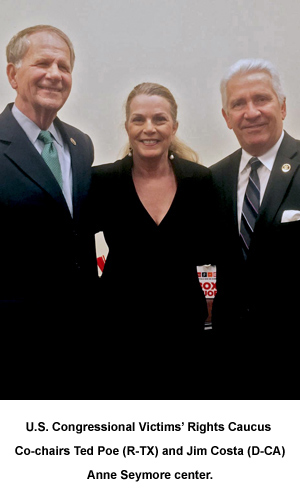Interview With Anne K. Seymour

Information Center: Will you give a brief background of your career? What drew you to victim services?
Ms. Seymour: I was a staffer in the California Legislature in the early 1980s, seeking work that could make use of my public policy and public affairs skills. In 1984 I became Director of Public Affairs for National MADD and, in 1986, co-founded what is now the National Center for Victims of Crime. I always describe my entry into the field as “accidental” but my 34+ year duration in the field as quite intentional; and feel fortunate to be doing work that, every single day, has a powerful and profound impact on crime victims and communities nationwide and around the world. What began almost 50 years ago as a grass-roots “movement” is today a professional field, and one that does so much good for so many people.
Information Center: What are some of the opportunities at NIC and in the field of corrections that the Advisory Board can explore and impact?
Ms. Seymour: As more and more states and the Federal government initiate justice reform and justice reinvestment initiatives, NIC and the entire corrections field have a critical leadership role in making sure that justice and corrections policy, programs and priorities make sense, are evidence-based, and result in “less crime and fewer victims.” I have been honored to work in over half the states to ensure that survivors and advocates are proactive participants in justice reinvestment and reform efforts, and their input has resulted in some important changes in laws that promote individual and public safety.
I also love that NIC is a leader in not only promoting, but demonstrating, the power of partnerships in public safety initiatives. I have seen what years ago we would have termed “strange bedfellows” emerge from new partnerships – for example, PREA/prisons/victim services, and crime victims and reentry programs – that really look at public policy and programming from a different, more collective lens than ever before. We need much more of that!
Information Center: How has victim services changed over the last few years? Where do you see it heading?
Ms. Seymour:Victim services has become more trauma-informed, evidence-based and collaborative over the past three decades. We are also focusing more on traditionally-underserved survivors and marginalized communities for victim/survivor assistance and crime prevention efforts. I see my field heading in a direction where victim/survivor advocacy and assistance is a truly professional field; where every survivor is treated with fairness, dignity and respect; and where partnerships eliminate the justice and community safety “silos” that were our comfort zone for too long.
Information Center: You have been a victim advocate at the national level and have received numerous honors. What has been a personally rewarding outcome of the work that you have done on behalf of victims?
Ms. Seymour:I go to bed every night knowing that something I did today, small or large, was helpful to someone in need. I am also proud that I have personally mentored a “next generation” of victim assistance professionals that is simply awesome. Dedicated. Compassionate. And in it for the long run.
Information Center: Victim’s fatigue is part and parcel in the advocacy community. What do you tell folks who convey to you victim’s fatigue, and what are your tips for health and wellness?
Ms. Seymour:I tell all professionals that you cannot be helpful to victims unless you are helpful to yourself. Victim advocates tend to always put others’ needs well before their own, and they need to work on being self-focused with a strengths-based approach; resilient; and even a little bit self-indulgent. There is also strength in professional peers who provide support and encouragement – the NIC staff and Advisory Board provide plenty of that to me on an ongoing basis! Finally, NIC has a wealth of resources on Health and Wellness for Corrections Professionals on the website, including a recent broadcast, Corrections Stress: Peaks and Valleys.
My tip for health and wellness (besides knowing that you CANNOT save the entire world) is to do something you love and that makes you feel good on a regular basis – biking, hiking, yoga, gardening, anything. I practice meditation and mindfulness, both very helpful to me personally. And really good chardonnay……………….LOL!
